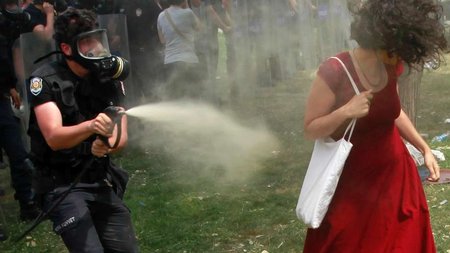The Istanbul Convention
Aims to prevent and combat violence against women and domestic violence through four pillars – prevention, protection, prosecution and integrated policies.
- Ratifiers: 33 countries
- Signatories: 45 countries
- Signed: 11 May 2011
The Norwegian Helsinki Committee strongly condemns the announcement of the withdrawal of Turkey from Council of Europe Convention on Preventing and Combating Violence Against Women and Domestic Violence, the Istanbul Convention, through the Presidential Decision No. 3718 on March 20.
– When a president is pulling out of a Convention that is aimed at protecting women from violence, it sends a message to women that they should not rely on the state when it comes to protection from violence, and it emboldens the perpetrators, says Mina Skouen, Head of the Equal Rights section in the Norwegian Helsinki Committee.
67 women were reported killed in Turkey only during the first 65 days of 2021; numbers that give some indication of how grave the problem of violence against women is even with the Istanbul Convention in place.
Mina Wikshåland Skouen
The Norwegian Helsinki Committee is concerned by the announcement of withdrawal from the Convention, the impact this will have on the protection of human rights, especially of women and girls, and the weakening effects it will have on the democratic process in Turkey.
A pioneer Convention
The Istanbul Convention is ratified by 33 Council of Europe member states, and is considered the most comprehensive document when it comes to the protection of women and girls from various forms of violence, including domestic abuse.
It is praised for the fact that it obliges states parties to the Convention to prevent violence, in addition to protection and prosecution, and that it presents standards for coordinated efforts and international oversight into state performance.
Urging states to ratify and uphold the principles of the Convention has become a powerful tool for women’s rights movement across Europe. Equally, it has also become a target from conservative groups, the anti-gender movement, some religious actors and others.
While Turkey is announcing its withdrawal, and Poland has voiced an intent to take the same route, the Ukrainian women’s movement have collected 25 000 signatures to make Ukraine ratify the Convention.
The attacks on the Convention harms only women and girls, who are under the risk that national laws and policies will remain inefficient or non-existent.
High prevalence of violence
In 2020, 284 women in Turkey were killed in feminicides, and another 255 deaths are suspected to fall in the same category, but this has not been fully established. In approximately 65% of the cases with known assailants, the perpetrator was a person the victim had or had had a close relationship with.
Women are victims of violence, rape, threats, child marriages, violence based on sexual orientation and sexual violence – all of which are issues that the Istanbul Convention offers protection from.
According to Turkish authorities, national legislation offers the same level of protection as the Istanbul Convention, and there is no need for meddling from the outside. However, the significance of the Convention is the fact that it ensures international oversight into the poor implementation of Turkey’s national laws and policies. Withdrawal from the Convention will mean that GREVIO, the independent expert body responsible for monitoring the implementation of the Convention, will not be able to provide international oversight.
Power gambit?
The announcement of the withdrawal from the Convention is not only an attack against women and girls in Turkey, but it also raises questions about President Erdogan’s dismantling of democratic procedures. Normally, withdrawal from an international instrument should follow the process of its ratification. Article 90 of the Turkish Constitution refers to the ratification of human rights treaties by the Parliament. The Presidential Decision to withdraw is based on a previous Presidential Decree No 9 paragraph 3 that assigns him the power to withdraw from a treaty. Yet, under Article 104 of the Constitution on executive powers, this power can only be interpreted as an executive power.
If the process of withdrawal had followed a legislative process, this would have allowed for some transparency and debate. This unilateral act by the President, however, seems to be yet another example of the President transgressing his limits. Constitutional lawyers in Turkey have pointed out that a withdrawal from a human rights treaty by the President through and executive act would be unconstitutional and would constitute usurpation of power.
The first to ratify the Convention
Erdogan’s move against the Istanbul Convention is in stark contrast to the participation of a wide range of actors from Turkey in the drafting process, and the strong support the Convention initially received. Turkey was the first state to ratify the Convention in 2012, and its membership in the Convention system has been backed by the women’s rights movement in Turkey to date.
The accusations that the Convention is a foreign construct is clearly wrong. It was developed with strong involvement and support from Turkey.
Mine Yildirim, the Head of the Freedom of Belief Initiative at the Norwegian Helsinki Committee, says the Convention was drafted with participation of actors from Turkey’s diverse and strong women’s movement.
– This concession to a small group of conservative opponents of the Convention goes against the need to combat violence against women and domestic violence and the support the Convention has in the society. An Istanbul Ekonomi Araştırmaları poll found that the support for withdrawal from the Convention was 8,87%. Those who supported the withdrawal were concerned that the Convention causes a rise in the numbers of divorce, victimizes men and was against Turkish traditions and morality, she underlines.
We should certainly be concerned about how the announcement to withdraw from the Convention will impact Turkish society in general, not only women. Because these concessions embolden groups, who now see that they have influence. What comes next?
Mine Yildirim
The most dangerous place is home
– The strength of this Convention is first and foremost that it is very comprehensive and demands systematic work on combating violence against women and girls and ensures that there is oversight, says Skouen.
– In addition to this, it is sensitive to the diversity of the groups it sets out to protect – women and girls – and to how complex violence against women can be.
– People claim that the problem with the Convention is that it promotes homosexuality and divorce. But the Convention does not promote anything – it simply provides protection in the sphere, which is most dangerous for a woman, regardless of her age, ethnic belonging, sexual orientation, gender identity, or religious affiliation: her home. This seems to be what causes the uproar among its opponents – that men cannot do what they want in their private sphere.
The impact of the Covid 19 pandemic, with less access to shelters and support groups, has reinforced the danger of domestic violence drastically, and the time to come should be used to increase, not reduce, effectiveness and level of protection. Therefore, the Norwegian Helsinki Committee:
- Urges to Turkey to repeal Presidential decree 3718, and announce its recommitment to the Istanbul Convention;
- Encourages other member states of the Council of Europe to challenge Turkey’s decision.
NHC also urges the international human rights community to closely monitor how violence against women and girls in Turkey will be tackled,and extend support to Turkish civil society.
Regardless of Turkey’s announcement, The Norwegian Helsinki Committee remains committed to monitoring the developments regarding prevention and combating violence against women and domestic violence in Turkey.


